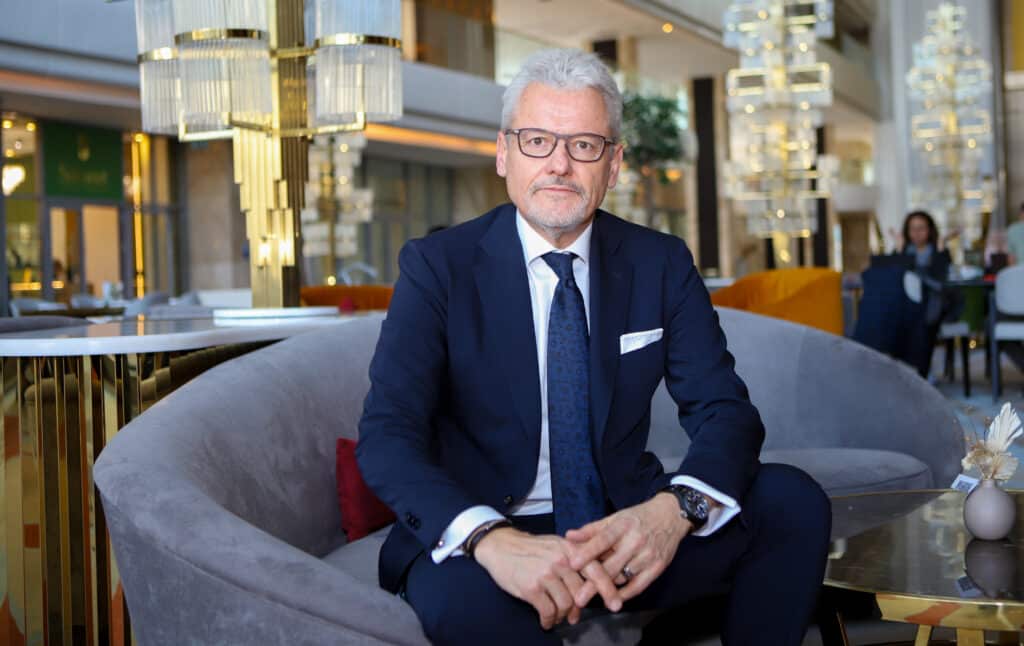Why Polpharma is expanding its investment in Kazakhstan

In early April, Kazakh Invest and Polpharma Group signed a memorandum on the development of pharmaceutical manufacturing in Kazakhstan. In an interview with Kursiv.media, Markus Sieger, CEO of Polpharma Group, explained why this document is so important for both parties and what Polpharma Group aims to achieve in Kazakhstan.
– Polpharma Group has signed a new memorandum with Kazakh Invest. What are the main objectives of the document?
– First of all, we are very pleased that the government of Kazakhstan supports our intention to help patients within the country and across the Central Asian region. As you know, Polpharma Group works primarily in Europe and Central Asia. Under the memorandum, we are going to boost our investments in Kazakhstan. This is a long-term commitment. We want to bring new products critical for oncology and diabetology to the local market. This is very important because many patients in Kazakhstan rely on these treatments in their everyday lives. Secondly, the partnership with Kazakh Invest will facilitate job creation and the transfer of new technologies, demonstrating the commitment of Polpharma Group to the strategic decision to invest in SANTO, a member of Polpharma Group, which was made about 14 years ago.
Furthermore, as Vice President of Medicines for Europe, the largest organization representing the interests of the pharmaceutical industry at the European government, I can say that more and more countries want to have their pharmaceutical production. They want to have this production as close to their people as possible. I think the approach the Kazakhstani government is applying is very wise because they are promoting a local industry that can produce the advanced medicines people need. This is a smart move to keep the production of critical medicines inside the country — or at least close to it — to reduce dependency on other nations.
– Is this a lesson from the COVID-19 pandemic?
– Exactly. We all learned our lesson during the pandemic when all supply chains were disrupted. This is why localization of pharma production is so important; we have to enhance and protect our supply chains. The only way to secure critical medicines for patients amid uncertainty is localization. It is also important to have a backup plan for your supply chains. Many substances come from China, Germany and other countries — I mean active substances, packaging, whatever. This is why it is so important to have local production along with sufficient stockpiles of critical materials.
In this regard, the memorandum we have signed is a synergy of efforts by both sides, as we are all aiming to ensure the sustainability of the supply of essential drugs for patients. During the pandemic, we saw how serious the consequences could be for countries without local production of critical treatments. This is why we are addressing that need by localizing the production of molecules necessary for essential drugs.
– Could you please tell us more about the details of the agreement?
– As I said, the memorandum describes our obligation to invest in pharmaceutical infrastructure and bring new technologies to Kazakhstan. We are going to invest at least €55 million in the local production of drugs the country needs the most. Usually, the Ministry of Health communicates to us which products are crucial for them, and we do the rest. The investment obligation will last ten years under the memorandum, but our commitment to the country and the region is limitless in terms of time.
– You mentioned job creation…
– The creation of new jobs is something we care about a lot. As you know, we have a large plant in Shymkent and have been working very closely with Kazakhstani universities over the past several years to contribute to the education and training of students. By doing this, we create a pool of well-prepared technicians and operators for our pharmaceutical manufacturing. But of course, we also have a lot of other jobs in the areas of R&D, finance, HR and so on. We already have a large team in Shymkent, and about 300 new jobs are expected to emerge under the memorandum.
After all, all these arrangements are designed to serve people. For me personally, this is the most important thing. These are the people who make it all happen. These are the people who operate the factory, check the quality and come up with new ideas. We really are a people-driven company because, at the end of the day, this is the biggest asset we have. We must care about our team and invest in it if we want to achieve something big.
– Why are Kazakhstan and Central Asia so important for the Group?
– Our company was founded in Poland 90 years ago and has long maintained ties with this region. About 14 years ago, we got an opportunity to invest in SANTO in Kazakhstan. We took this very seriously, investing more than $118 million in the company. Over the past two years alone, we have invested €20 million in the most advanced Innovations & Quality Center, which includes microbiological and quality laboratories, as well as an R&D center in Kazakhstan. Now, our plant in Shymkent has the most advanced lab within the entire Polpharma Group — and we have five plants in Poland. So, as you can see, Kazakhstan is a vital part of our operations, accounting for 20% of Polpharma’s total revenue. It is one of the key growth areas where we want to invest.
As I mentioned before, we want to produce more advanced products here in Kazakhstan. These are complex products requiring complicated technologies, and this is why we need to invest in our R&D and quality labs to have the capacity to produce all those state-of-the-art treatments.
In pharma, every improvement process takes time because almost all governments want to ensure the drugs their citizens use are safe. There’s the Food and Drug Administration (FDA) in the U.S. and the European Medicines Agency (EMA) in the EU, which probably raise the highest quality standards in the pharmaceutical sector. And we are doing well in terms of these requirements. We have applied for the EU GMP, for example, and a corresponding audit was completed recently. I think it’s safe to say that we will certainly obtain this certificate; it’s simply a matter of time. Once we get it, SANTO’s plant in Shymkent will be the first production site in Central Asia to be certified by European GMP. This means our production here meets the highest international quality standards.
– What are the advantages of this certification for Kazakhstan?
– The EU GMP project is important not only for Kazakh patients but also for Kazakhstan’s economy. If you have an EU GMP certificate, you can sell your products in different markets, boosting your revenue. I believe we have the potential in terms of drug exports, and I know that this is what the Kazakh government wants us to do.
There are three key aspects here. First of all, this is about having a better quality of products. We are now able to produce more complex products. Secondly, this also benefits the patient. We can bring more and more advanced technologies, and this is one of the reasons we signed that memorandum — because we would like to bring more of those innovative products to the local market.
We know from the audit that there were no observations that could hinder us from obtaining the certificate. We had just a few comments about possible improvements, but we met all the important rules. Secondly, we have elevated the quality standards, procedures and testing to a level that is comparable to anybody else in Europe or elsewhere. As a result, we will be able to export our products abroad to those markets that require EU GMP quality certification. In addition, we have repeatedly received positive feedback from healthcare professionals, which also speaks to the high quality of our products. In the pharmaceutical industry, quality is literally everything. That is why we invest so much in this area.
Significant investments helped us achieve a very high level of quality. And everything is interconnected here. You can’t just say, «Hey, come on, let’s obtain EU GMP,» because you have to do a lot of preparation first. For example, the €20 million we invested in the Innovations & Quality Center was planned five years ago. Then, we needed a special permit from the government before we could order equipment and install it in our new building. The building itself also had to meet GMP standards. So, this was a long process, which took about five years. And now we’ve almost completed it.
As a result, the EU GMP and the memorandum we signed give us an amazing synergy that creates new opportunities for the future. Under the memorandum, SANTO will be able to replace imports of some drugs for diabetics that Kazakhstan currently purchases from Germany, France and other countries if the Ministry of Health asks us to localize their production.
– What kind of drugs have you discussed with the government recently?
We are focused primarily on two fields: oncology and diabetology. But our ultimate goal goes beyond that. What we want is to help people live a healthy life in a healthy world. With proper information, training and products like vitamins and food supplements, people can indeed stay healthy for a very long time.
– Where are you going to export your products once you have the EU GMP certificate?
First and foremost, our key commitment is to supply the local market in Kazakhstan. We didn’t invest in the SANTO Member of Polpharma Group plant only to boost our exports to Europe, although if we have additional capacity and demand, we can sell our products everywhere. When you have EU GMP, you can sell your drugs to any EU member state or elsewhere. For example, in Vietnam, if a pharma company complies with FTA or EMA production standards, it has all doors open. We already sell medicines to Vietnam from Poland, and soon we will be able to sell them from Kazakhstan.
So far, we have been exporting less than 12% of our products. We are focused on supplying drugs to the local market. At the same time, we also keep in mind our major export destinations, such as Central Asia and the CIS. However, the EU GMP we talked about will expand the entry ticket for our products. With all our investments, the capacity of SANTO’s production is also increasing and that is going to be a game changer in the future.
But, once again, it has never been the prime reason for us. All we want is to create a modern and effective production platform here in Kazakhstan. This is what we are doing — pursuing the highest standards, which is good for the people of Kazakhstan. At the same time, we’ll be happy to see more export opportunities as a result of the synergy between high quality and significant production capacity that develops along the way. If we have the capacity, we can double our exports, earning more tax revenue for Kazakhstan and contributing to the country’s image as an exporter of sophisticated medicines.

